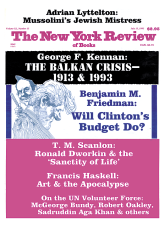In response to:
Professor Lenny from the June 10, 1993 issue
To the Editors:
Joseph Horowitz [NYR, June 10] deserves our gratitude for offering a long-overdue appraisal of Leonard Bernstein’s teaching programs on US television in the 1950s and 60s. It is difficult to disagree with his pessimistic conclusion that the new popular culture “erased the high culture berths once reserved for classical music on commercial television.” But Mr. Horowitz’s suggestion that in later life Leonard Bernstein was reduced to the status of an eccentric Great Performer needs to be challenged.
As his biographer, I see the turning point in his relationship with American television to be the depressing episode in 1970 when CBS-TV commissioned and paid for a bicentennial celebration of Beethoven’s life, but declined to broadcast the ninety-minute program because no sponsor could be found for it. But Bernstein did not stop making educational programs for television: he made them instead in Europe—in Britain, Germany, and Austria—where the cultural climate in television was still similar to the idealistic days of Omnibus and Ford Presents. Thus in 1971 he wrote and narrated an hour-long feature about Mahler’s Ninth Symphony entitled Four Ways to Say Farewell. In 1972 he did a portrait of Stravinsky, followed in 1977 by a detailed account of Les Noces. In the 1980s he wrote two essays on Shostakovitch symphonies (numbers six and nine), a lengthy demonstration of the all-pervading Jewishness, as he saw it, of Mahler’s music, and an analysis of Charles Ives’s Second Symphony. An essay on Wagner was never finished. He also spent television time on his own life and music, making portraits of the principal influences in his life in Teachers and Teaching and his Love of Three Orchestras (New York, Vienna, and Israel). He made television features about his own Age of Anxiety, Songfest and West Side Story.
Mr. Horowitz thinks Bernstein was letting the side down by no longer championing American music in his Young People’s Concerts. But he stopped doing YPCs in 1972 because after fourteen consecutive seasons he felt he was running out of steam. Hence the eagerness with which he accepted Harvard’s invitation to deliver the Charles Eliot Norton Lectures. They were not an extension of his earlier work for children, as Mr. Horowitz implies. Neither were they “prepared helter-skelter from one meeting to the next.” On the contrary, Bernstein lived on campus for three semesters while he was writing them, and they became so elaborate that delivery had to be deferred from spring 1973 to the fall. Their scale was without precedent in the history either of the Norton Lectures or, I think, of televised musical pedagogy. The telecasts (taped at WGBH in Boston) run as long as three hours, while the paperback of the texts and music examples contains over four hundred pages. Horowitz describes Bernstein’s delivery of the Lectures as “uncomfortable.” Really? David Schiff in this month’s Atlantic magazine calls him a “master teacher.” Helping to produce the programs in 1973, I thought he was music’s answer to Kenneth Clark.
Horowitz writes off Bernstein’s Norton Lecture arguments as “impossibly tendentious,” but who would now deny that in nailing to the mast his belief in the innate durability of the tonal system—“the poetry of earth” as he called it (referring to the laws of physics which define the harmonic system)—he was doing his bit to lead the musical world out of the twelve-tone wilderness?
Finally, I must raise an eyebrow at Mr. Horowitz’s assertion that the New York Philharmonic would not allow Bernstein to speak at a 1984 Young People’s Concert because he was “crazy.” The Philharmonic’s management has changed in the past decade; I could find nobody who could throw light on the affair. What I do know is that in 1990, shortly before he died, Bernstein was discussing the creation of a new teaching venture entitled The New York Philharmonic Institute. Does Mr. Horowitz imagine that Leonard Bernstein would ever have submitted to being gagged by the institution of which he had been made laureate conductor for life?
Humphrey Burton
New York City
Joseph Horowitz replies:
- Humphrey Burton’s own list shows that Leonard Bernstein’s output of educational programs for television subsided sharply after 1980. I would not call Bernstein’s “television features” on Age of Anxiety, Songfest, and West Side Story “educational programs.”
- It wasn’t just in his Young People’s Concerts that Bernstein championed American music. His early TV shows are full of America. The Norton lectures (1973) barely mention American music.
- Mr. Burton enlists David Schiff’s article to challenge my description of Bernstein’s delivery of the first Norton lecture. And yet Schiff, in The Atlantic, calls Bernstein “uncomfortable” and “fidgety” and adds: “You can see the lack of audience response throw him off balance as he tried to ad lib.” It’s true the Norton lectures run more than four hundred pages—and that they change course from one meeting to the next. In his best TV work, Bernstein was a master of compression.
-
I specifically call Bernstein’s Norton readings of Schoenberg and Stravinsky “impossibly tendentious,” not the arguments about tonality.
-
The remark by a high New York Philharmonic official (no longer with the orchestra) was made to me shortly after the March 4, 1984, Young People’s Concert, which was structured so that Bernstein would only speak on film (Roger Englander was the host) even though the concert was a Bernstein tribute during which he appeared on stage for more than half an hour. Bernstein’s silence was an amazement.
I mean no disrespect for Mr. Burton, and I look forward to his much needed biography, but I do feel that Bernstein’s most memorable, most original television programs—I, too, call him a “master educator”—happen to predate the Norton lectures and Great Performances he undertook in association with Mr. Burton. This is the nub of Mr. Burton’s complaint.
This Issue
July 15, 1993



